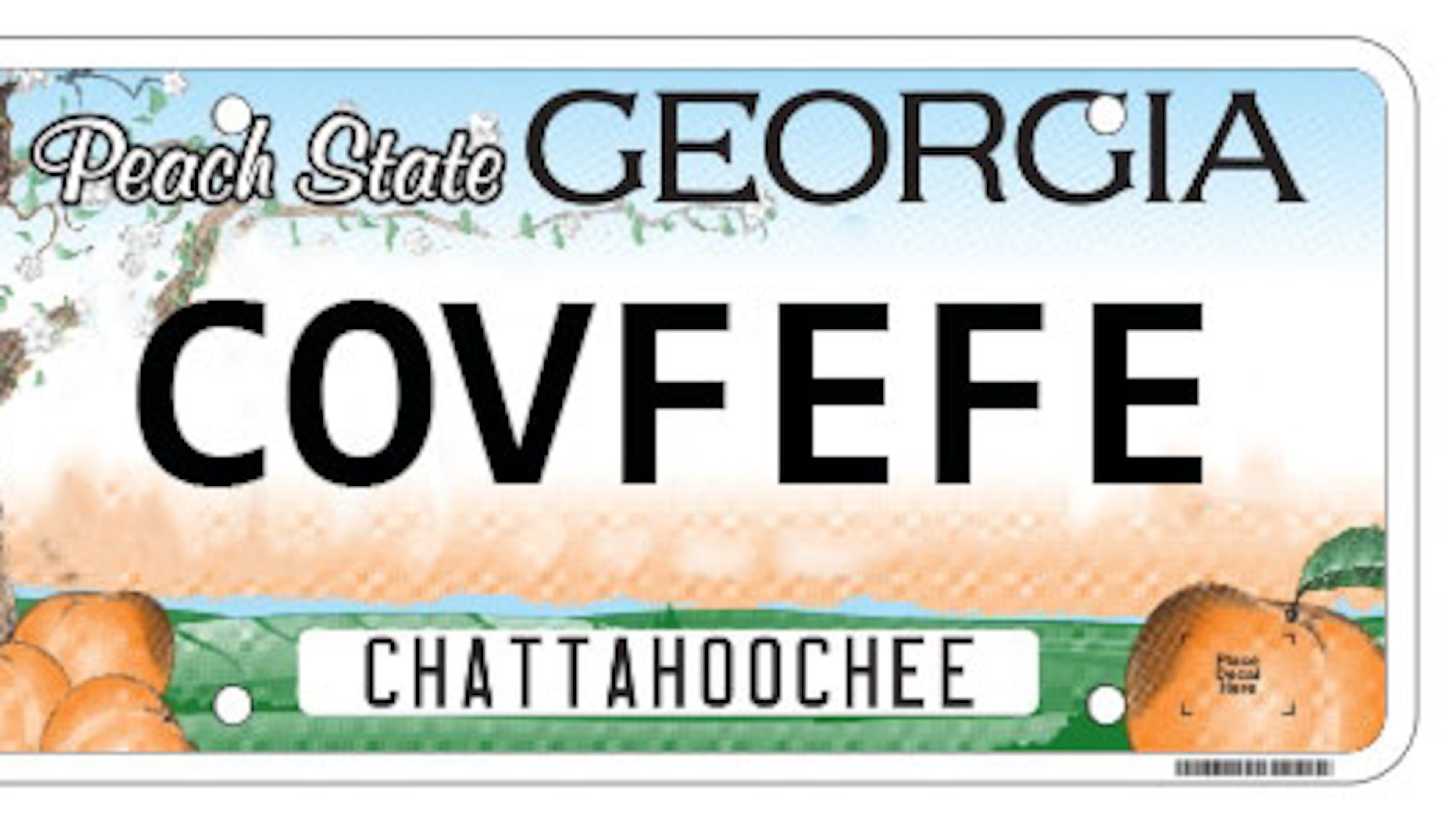‘Covfefe’ on list of vanity license plates banned in Georgia

The Internet may still be abuzz about the meaning of "covfefe," but whatever it means, Georgia drivers apparently can't get it on a vanity license plate.
Seven variations of the nonsensical word tweeted by President Donald Trump appear on a list that the state provided to The Atlanta Journal-Constitution earlier this month, following the AJC’s request for a copy of the state’s list of banned license plates.
So, along with “H0TBODY,” “2SXC4U,” “BUTT,” “KKK” and “PERVERT” on the list of 8,000-plus banned plate combinations are “C0VFEFE,” “C0VFEF3,” “C0VFEVE,” “C0VF3FE,” “C0VF3F3,” “C0VVEFE” and “C0VVEFE.”
It was not clear at presstime whether the combinations on the list represent words pre-emptively banned from plates, or plates that have been applied for and were rejected, or some of both. A spokesman for the state Department of Revenue, which oversees the state’s license plate functions, did not respond by presstime to that question or others sent by the AJC via email last Monday. The spokesman said he was looking into the issue but did not respond to additional phone, email and text messages last week.
However, a version of the banned plate list provided by the Department of Revenue to the AJC in 2013 was described as a list of plates that had been applied for and which had been rejected.
The “covfefe” variants weren’t on the list in 2013.
But then, there was no “covfefe” in 2013.
The term didn’t exist until 12:06 a.m. May 31, 2017, when President Trump tweeted “Despite the constant negative press covfefe.” The tweet was deleted six hours later, but by then “covfefe” had solidified itself as a meme.
Within a few hours of the initial tweet, a man in California and a man in Nebraska ordered “C0VFEFE” license plates.
Within two days of the tweet, people in 21 states had applied for "covfefe" license plates, according to a June 2 CNN story.
Just what the word means, or whether it was a Twitter typo, is not clear. “The president and a small group of people know exactly what he meant,” White House Press Secretary Sean Spicer said when asked about it.
But it’s not clear why the state would ban the “covfefe” plates.
State law instructs the Department of Revenue to reject vanity plate combinations that are "obscene according to current community standards." The law also bans references to sexual acts (also on the current banned list is "SEXIE1"); body parts or any bodily fluids ("UTERUS"); disparaging a religious belief ("0MYG0D"); being, race, ethnicity, gender or sexual orientation ("WYTRASH"), phrases subject to copyright (such as "NISSAN" and references to many pro sports teams, such as "STEELERS"), and references to drugs, alcohol, or criminal activity ("MURDER," "SMOKIT").
But political speech -- if that’s what “covfefe” is -- is not referenced in the law.
For instance, neither the names “TRUMP” nor “OBAMA” appear on the list given to the AJC in any form.
"Given the word 'covfefe' has a political meaning, the state can't ban it because there are no provisions for rejecting political speech in their statute, and I'd say it is unconstitutional because rejecting 'covfefe' without rejecting all political speech means their decision is not viewpoint-neutral," said Bruce Brown, an Atlanta-based trial lawyer with experience in First Amendment law.
Brown said the state’s license plate policy is constitutional only if the standards are applied in a manner that is content-neutral. The state may elect to ban all political speech or allow all political speech, but it may not cherry pick the messages it accepts or rejects, he said. And states also aren’t required to issue any vanity plates.
“Deciding what plates are permissible under state law or constitutional seems to be more effort than it’s worth,” Brown said.
And the state has been sued over a banned license plate before, when it denied James Cyrus Gilbert a “GAYPWR” vanity plate in 2013.
The state settled the case, agreeing to approve Gilbert’s plate. It also agreed to conduct periodic reviews of prestige tags and add provisions to the law banning references to drugs, sex, alcohol and discrimination based on sexual orientation.
“Covfefe” has political implications, said Gerry Weber, who was one of Gilbert’s attorneys. “A person who has that tag would be engaging in political speech,” Weber said. “‘Covfefe’ does not fall into any category the state has permission to ban.”
An AJC story published prior to Gilbert's lawsuit found that inconsistencies in which vanity tags were rejected and approved in Georgia stemmed from many state employees with many different views making decisions on what is offensive.
The U.S. Supreme Court ruled two years ago that license plates are government speech, and therefore not given the First Amendment free speech protections of citizens' speech. That case, Walker v. Texas, was brought by a Sons of Confederate Veterans group that wanted Texas to issue a specialty plate design featuring a Confederate flag.
What Georgia state employees interpret “covfefe” to mean is not clear. The current application form filled out by people who want a Georgia vanity plate includes a “Meaning” section, where the applicant is asked to explain what the desired plate combination means.
The government should not be in the business of deciding what political speech is allowed or not allowed, said Sean J. Young, legal director of the Georgia chapter of the American Civil Liberties Union:
“What I would tell the government is to get a life.”
CORRECTION: This story was updated at 11:58 a.m. to reflect the correct spelling of Gerry Weber’s first name.

